- Home
- Ken Follett
A Dangerous Fortune (1994) Page 17
A Dangerous Fortune (1994) Read online
Page 17
And he won't see David Middleton for years, Augusta thought with satisfaction. "Splendid. It's settled, then." Were there any other snags? She remembered Maisie. Did Hugh care for her? It seemed unlikely, but anything was possible. He might refuse to be parted from her. It was a loose end, and it worried Augusta. Hugh could not possibly take a trollop to Boston with him, but on the other hand he might refuse to leave London without her. Augusta wondered if she could nip the romance in the bud, just as a precaution.
She stood up and moved to the door that communicated with her bedroom. Joseph looked disappointed. "I must get rid of that girl," she said.
"Anything I can do?"
The question surprised her. It was not liked him to make generalized offers of help. He wanted another look at the whore, she thought sourly. She shook her head. "I'll come back. Get into bed."
"Very well," he said reluctantly.
She went into her own room and closed the door firmly behind her.
Maisie was clothed again and pinning her hat to her hair. Mrs. Merton was folding up a rather flashy blue-green gown and cramming it into a cheap bag. "I've loaned her a dress of mine, as hers is soaked, mum," said the housekeeper.
That answered a little question that had been nagging Augusta. She had thought it was unlike Hugh to do something as blatantly stupid as to bring home a whore. Now she saw how it had come about. They had been caught in the sudden storm, and Hugh had brought the woman inside to get dry, then one thing had led to another.
"What is your name?" she said to the girl.
"Maisie Robinson. I know yours."
Augusta found that she loathed Maisie Robinson. She was not sure why: the girl was hardly worthy of such strong feelings. It had something to do with the way she had looked when naked: so proud, so voluptuous, so independent. "I suppose you want money," Augusta said disdainfully.
"You hypocritical cow," Maisie said. "You didn't marry that rich, ugly husband of yours for love."
It was the truth, and the words took Augusta's breath away. She had underestimated this young woman. She had made a bad beginning, and now she had to dig herself out of the hole. From now on she must handle Maisie carefully. This was a providential opportunity, and she must not waste it.
She swallowed hard and forced herself to sound neutral. "Will you sit down for a moment?" She indicated a chair.
Maisie looked surprised, but after a moment's hesitation she took a seat.
Augusta sat opposite her.
The girl had to be made to give Hugh up. She had been scornful when Augusta had hinted at a bribe, and Augusta was reluctant to repeat the offer: she sensed that money would not work with this girl. But she was clearly not the type to be bullied either.
Augusta would have to make her believe that separation would be the best thing for both Maisie and Hugh. It would work best if Maisie thought that giving Hugh up was her own idea. And that might be best achieved by Augusta arguing the opposite. Now, there was a good notion....
Augusta said: "If you want to marry him, I can't stop you." The girl looked surprised, and Augusta congratulated herself on having caught her off guard.
"What makes you think I want to marry him?" Maisie said.
Augusta almost laughed. She wanted to say The fact that you're a scheming little gold digger, but instead she said: "What girl wouldn't want to marry him? He's personable and good-looking and he comes from a great family. He has no money, but his prospects are excellent."
Maisie narrowed her eyes and said: "It almost sounds as if you want me to marry him."
Augusta intended to give exactly that impression, but she had to tread delicately. Maisie was suspicious and seemed too bright to be easily hoodwinked. "Let's not be fanciful, Maisie," she said. "Forgive me for saying so, but no woman of my class would wish a man of her family to marry quite so far below him."
Maisie showed no resentment. "She might if she hated him enough."
Feeling encouraged, Augusta continued to lead her on. "But I don't hate Hugh," she said. "Whatever gave you that idea?"
"He did. He told me you treat him as a poor relation and make sure everyone else does the same."
"How ungrateful people can be. But why would I wish to ruin his career?"
"Because he shows up that ass of a son of yours, Edward."
A wave of anger engulfed Augusta. Once again Maisie had come uncomfortably close to the truth. It was true that Edward lacked Hugh's low cunning, but Edward was a fine, sweet young man and Hugh was ill-bred. "I think you had better not mention the name of my son," Augusta said in a low voice.
Maisie grinned. "I seem to have touched a sore place." She immediately became grave again. "So that's your game. Well, I won't play it."
"What do you mean?" said Augusta.
Suddenly there were tears in Maisie's eyes. "I like Hugh too much to ruin him."
Augusta was surprised and pleased by the strength of Maisie's passion. This was working out perfectly, despite the bad beginning. "What are you going to do?" Augusta asked.
Maisie struggled not to cry. "I shan't see him anymore. You may yet destroy him, but you won't have my help."
"He might come after you."
"I shall disappear. He doesn't know where I live. I'll stay away from the places where he might look for me."
A good plan, Augusta thought; you'll only need to keep it up for a short while, then he will go abroad and be away for years, perhaps forever. But she said nothing. She had led Maisie to the obvious conclusion and now the girl needed no further help.
Maisie wiped her face on her sleeve. "I'd better go now, before he comes back with the doctor." She stood up. "Thank you for lending me your dress, Mrs. Merton."
The housekeeper opened the door for her. "I'll show you out."
"We'll take the back stairs this time, please," Maisie said. "I don't want--" She stopped, swallowed hard, and said in a near-whisper: "I don't want to see Hugh again."
Then she went out.
Mrs. Merton followed and closed the door.
Augusta let out a long breath. She had done it. She had stunted Hugh's career, neutralized Maisie Robinson, and averted the danger from David Middleton, all in one night. Maisie had been a formidable opponent, but in the end she had proved too emotional.
Augusta savored her triumph for a few moments then went to Edward's room.
He was sitting up in bed, sipping brandy from a goblet. His nose was bruised and there was dried blood around it, and he looked somewhat sorry for himself. "My poor boy," Augusta said. She went to his nightstand and damped a corner of a towel, then sat on the edge of the bed and wiped the blood from his upper lip. He winced. "Sorry!" she said.
He gave her a smile. "That's all right, Mother," he said. "Do carry on. It's very soothing."
While she was washing him Dr. Humbold came in, closely followed by Hugh. "Have you been fighting, young man?" the doctor said cheerily.
Augusta took exception to that suggestion. "He certainly has not," she said crossly. "He has been attacked."
Humbold was crushed. "Quite so, quite so," he muttered.
Hugh said: "Where's Maisie?"
Augusta did not want to talk about Maisie in front of the doctor. She stood up and took Hugh outside. "She left."
"Did you send her away?" he demanded.
Augusta was inclined to tell him not to speak to her in that tone of voice, but she decided there was nothing to be gained by angering him: her victory over him was already total, though he did not know it. She said in a conciliatory tone: "If I had thrown her out, do you not think she would have been waiting in the street to tell you so? No, she left of her own accord, and she said she would write to you tomorrow."
"But she said she would still be here when I got back with the doctor."
"Then she changed her mind. Have you never known a girl of her age to do that?"
Hugh looked bewildered, but he did not know what to say next.
Augusta added: "No doubt she wished to extricat
e herself as quickly as possible from the embarrassing position in which you had put her."
That seemed to make sense to him. "I suppose you made her feel so uncomfortable that she couldn't bear to remain in the house."
"That will do," she said severely. "I don't wish to hear your opinions. Your uncle Joseph will see you first thing in the morning, before you leave for the bank. Now good night."
For a moment it seemed as if he would argue. However, there was really nothing for him to say. "Very well," he muttered at last. He turned into his room.
Augusta went back into Edward's room. The doctor was closing his bag. "No real damage," he said. "His nose will feel tender for a few days, and he may have a black eye tomorrow; but he's young, and he'll soon heal."
"Thank you, Doctor. Hastead will see you out."
"Good night."
Augusta bent over the bed and kissed Edward. "Good night, dear Teddy. Go to sleep, now."
"Very well, Mother dear. Good night."
She had one more task to perform.
She went down the stairs and entered Joseph's room. She was hoping he would have gone to sleep waiting for her, but he was sitting up in bed, reading the Pall Mall Gazette. He put it aside immediately and lifted the covers to let her in.
He embraced her immediately. It was quite light in the room: dawn had broken without her noticing it. She closed her eyes.
He entered her quickly. She put her arms around him and responded to his movements. She thought of herself when she was sixteen, lying on a riverbank in a raspberry-pink dress and a straw hat, being kissed by the young earl of Strang; only in her mind he did not stop at kissing her, but lifted her skirts and made love to her in the hot sunshine, with the river lapping at their feet....
When it was over she lay beside Joseph for a while, reflecting on her victory.
"Extraordinary night," he murmured sleepily.
"Yes," she said. "That awful girl."
"Mmm," he grunted. "Very striking-looking ... arrogant and willful ... thinks she's as good as anyone ... lovely figure ... just like you at that age."
Augusta was mortally offended. "Joseph!" she said. "How could you say such an awful thing?"
He made no reply, and she saw that he was asleep.
Enraged, she threw back the covers, got out of bed and stamped out of the room.
She did not go back to sleep that night.
Section 6
MICKY MIRANDA'S LODGINGS IN CAMBERWELL consisted of two rooms in the house of a widow with a grown son. None of his high-class friends had ever visited him there, not even Edward Pilaster. Micky played the role of a young man-about-town on a very tight budget, and elegant accommodation was one of the things he could manage without.
At nine o'clock each morning the landlady brought coffee and hot rolls for him and Papa. Over breakfast, Micky explained how he had caused Tonio Silva to lose a hundred pounds he did not have. He did not expect his father to sing his praises, but he did hope for a grudging acknowledgment of his ingenuity. However, Papa was not impressed. He blew on his coffee and slurped it noisily. "So, has he gone back to Cordova?"
"Not yet, but he will."
"You hope. So much trouble, and still you only hope he will go."
Micky felt wounded. "I'll seal his fate today," he protested.
"When I was your age ..."
"You would have slit his throat, I know. But this is London, not Santamaria Province, and if I go around cutting people's throats they'll hang me."
"There are times when you have no choice."
"But there are other times when it's better to tread softly, Papa. Think of Samuel Pilaster, and his milk-and-water objections to dealing in guns. I got him out of the way without bloodshed, didn't I?" In fact Augusta had done it, but Micky had not told Papa that.
"I don't know," Papa said stubbornly. "When do I get the rifles?"
It was a sore point. Old Seth was still alive, still Senior Partner of Pilasters Bank. It was August. In September the winter snow would start to melt on the mountains of Santamaria. Papa wanted to go home--with his weapons. As soon as Joseph became Senior Partner, Edward would put the deal through and the guns would be shipped. But old Seth clung on with infuriating stubbornness to his post and his life.
"You'll get them soon, Papa," said Micky. "Seth can't last much longer."
"Good," said Papa, with the smug expression of one who has won an argument.
Micky buttered a roll. It had always been like this. He could never please his father no matter how he tried.
He turned his mind to the day ahead. Tonio now owed money he could never pay. The next step was to turn a problem into a crisis. He wanted Edward and Tonio to quarrel publicly. If he could arrange that, Tonio's disgrace would become general knowledge and he would be obliged to resign from his job and go home to Cordova. That would put him comfortably out of the reach of David Middleton.
Micky wanted to do all this without making an enemy of Tonio. For he had another purpose: he wanted Tonio's job. Tonio could make matters difficult, if he felt so inclined, by maligning Micky to the minister. Micky wanted to persuade him to smooth the path.
The whole situation was complicated by the history of his relationship with Tonio. At school Tonio had hated and feared Micky; more recently Tonio had been admiring of him. Now Micky needed to become Tonio's best friend--at the same time as he ruined his life.
While Micky was brooding over the tricky day ahead of him, there was a knock at the door to the room and the landlady announced a visitor. A moment later Tonio came in.
Micky had been planning to call on him after breakfast. This would save him the trouble.
"Sit down, have some coffee," he said cheerfully. "Bad luck last night! Still, winning and losing, that's what cards are all about."
Tonio bowed to Papa and sat down. He looked as if he had not slept. "I lost more than I can afford," he said.
Papa grunted impatiently. He had no patience with people feeling sorry for themselves, and anyway he despised the Silva family as lily-livered city dwellers who lived by patronage and corruption.
Micky pretended sympathy and said solemnly: "I'm sorry to hear that."
"You know what it means. In this country, a man who doesn't pay his gambling debts isn't a gentleman. And a man who isn't a gentleman can't be a diplomat. I might have to resign and go home."
Exactly, thought Micky; but he said in a sorrowful voice: "I do see the problem."
Tonio went on: "You know what fellows are like about these things--if you don't pay up the next day you're already under suspicion. But it would take me years to pay back a hundred pounds. That's why I've come to you."
"I don't understand," said Micky, though he understood perfectly.
"Will you give me the money?" Tonio pleaded. "You're Cordovan, not like these English; you don't condemn a man for one mistake. And I would pay you back, eventually."
"If I had the money I'd give it to you," said Micky. "I wish I were that well off."
Tonio looked at Papa, who stared at him coldly and said simply: "No."
Tonio hung his head. "I'm such a fool about gambling," he said in a hollow voice. "I don't know what I'm going to do. If I go home in disgrace I won't be able to face my family."
Micky said thoughtfully: "Perhaps there is something else I can do to help."
Tonio brightened. "Oh, please, anything!"
"Edward and I are good friends, as you know. I could speak to him on your behalf, explain the circumstances, and ask him to be lenient--as a personal favor to me."
"Would you?" Tonio's face was suffused with hope.
"I'll ask him to wait for his money, and not to tell anyone. I don't say he'll agree to it, mind you. The Pilasters have money by the bucketful but they're a hard-headed bunch. I'll try, anyway."
Tonio clasped Micky's hand. "I don't know how to thank you," he said fervently. "I'll never forget this."
"Don't raise your hopes too high--"
"I can'
t help it. I've been in despair, and you've given me a reason to go on." Tonio looked shamefaced and added: "I thought of killing myself this morning. I walked across London Bridge and I was going to throw myself into the river."
There was a soft grunt from Papa, who clearly thought that would have been the best thing all round.
Micky said hastily: "Thank God you changed your mind. Now, I'd better go along to Pilasters Bank and talk to Edward."
"When will I see you?"
"Will you be at the club at lunchtime?"
"Of course, if you want me to."
"Meet me there, then."
"Right." Tonio stood up. "I'll leave you to finish your breakfast. And--"
"Don't thank me," Micky said, holding up his hand in a silencing gesture. "It's unlucky. Wait and hope."
"Yes. All right." Tonio bowed again to Papa. "Goodbye, Senor Miranda." He went out.
"Stupid boy," Papa muttered.
"A complete fool," Micky agreed.
Micky went into the next room and dressed in his morning clothes: a white shirt with a stiff upright collar and starched cuffs, buff-colored trousers, a black satin stock which he took the trouble to tie perfectly, and a black double-breasted frock coat. His shoes gleamed with wax and his hair shone with macassar oil. He always dressed elegantly but conservatively: he would never wear one of the fashionable new turndown collars, or carry a monocle like a dandy. The English were ever ready to believe that a foreigner was a cad, and he took care to give them no excuse.
Leaving Papa to his own devices for the day, he went out and walked across the bridge into the financial district, which was called the City because it covered the square mile of the original Roman city of London. Traffic was at a complete standstill around St. Paul's Cathedral as carriages, horse buses, brewers' drays, hansom cabs and costermongers' barrows competed for space with a huge flock of sheep being driven to Smithfield meat market.
Pilasters Bank was a big new building with a long classical frontage and an imposing entrance flanked by massive fluted pillars. It was a few minutes past noon when Micky went through the double doors into the banking hall. Although Edward rarely got to work before ten, he could generally be persuaded to leave for lunch any time after twelve.

 The Pillars of the Earth
The Pillars of the Earth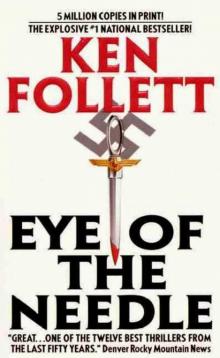 Eye Of The Needle
Eye Of The Needle Lie Down With Lions
Lie Down With Lions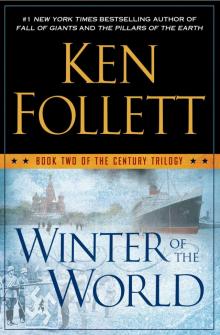 Winter of the World
Winter of the World Triple
Triple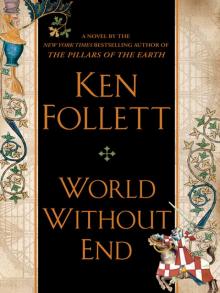 World Without End
World Without End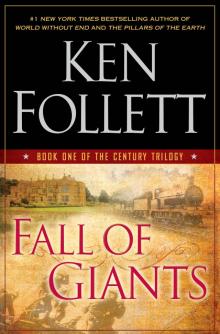 Fall of Giants
Fall of Giants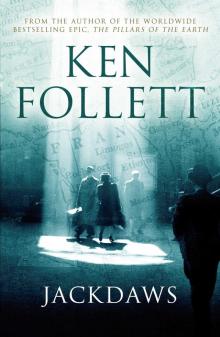 Jackdaws
Jackdaws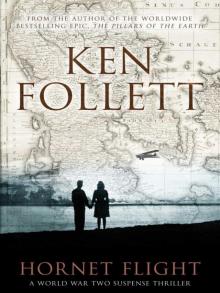 Hornet Flight
Hornet Flight Whiteout
Whiteout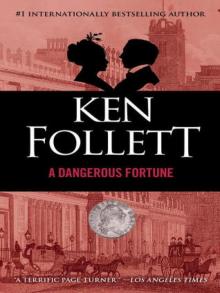 A Dangerous Fortune
A Dangerous Fortune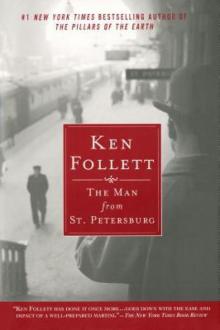 The Man From St. Petersburg
The Man From St. Petersburg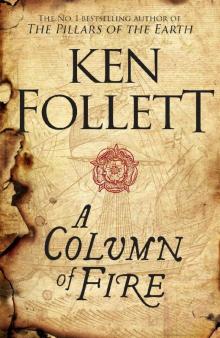 A Column of Fire
A Column of Fire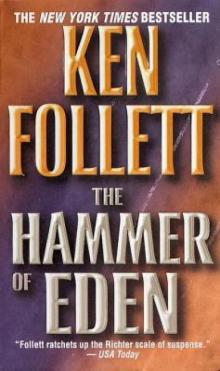 The Hammer of Eden
The Hammer of Eden On Wings of Eagles
On Wings of Eagles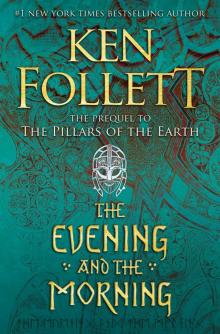 The Evening and the Morning
The Evening and the Morning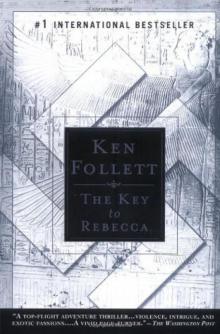 The Key to Rebecca
The Key to Rebecca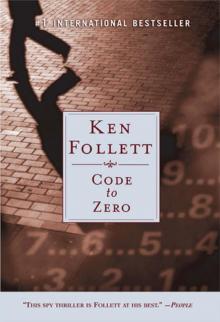 Code to Zero
Code to Zero Paper Money
Paper Money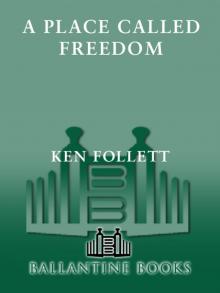 A Place Called Freedom
A Place Called Freedom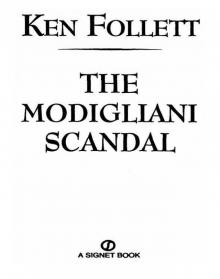 The Modigliani Scandal
The Modigliani Scandal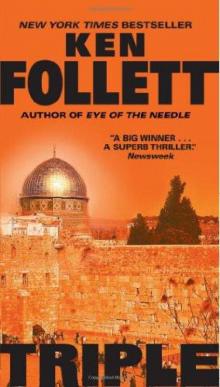 Triple (1991)
Triple (1991)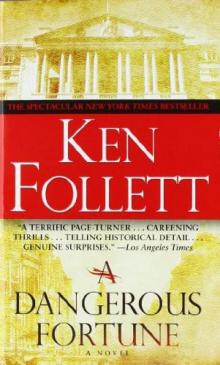 A Dangerous Fortune (1994)
A Dangerous Fortune (1994)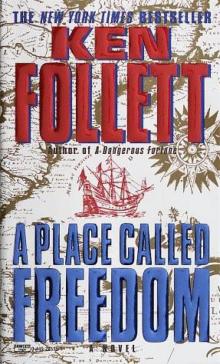 A Place Called Freedom (1995)
A Place Called Freedom (1995)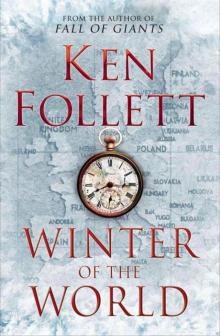 Winter of the World (Century Trilogy 2)
Winter of the World (Century Trilogy 2)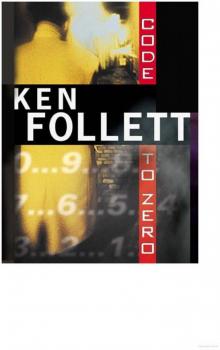 Code to Zero (2000)
Code to Zero (2000) On Wings Of Eagles (1990)
On Wings Of Eagles (1990) Storm Island
Storm Island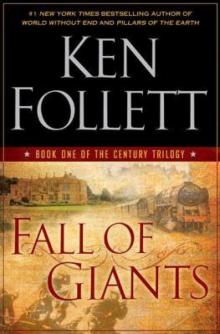 Fall of Giants (The Century Trilogy)
Fall of Giants (The Century Trilogy)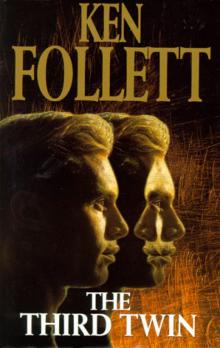 the Third Twin (1996)
the Third Twin (1996)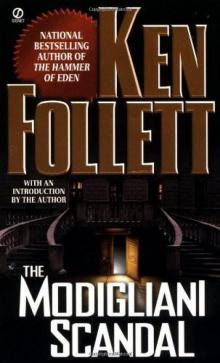 The Modigliani Scandal (1976)
The Modigliani Scandal (1976)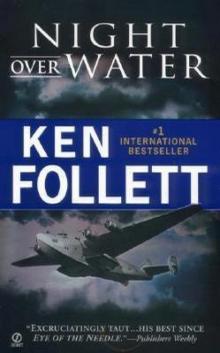 Night Over Water
Night Over Water